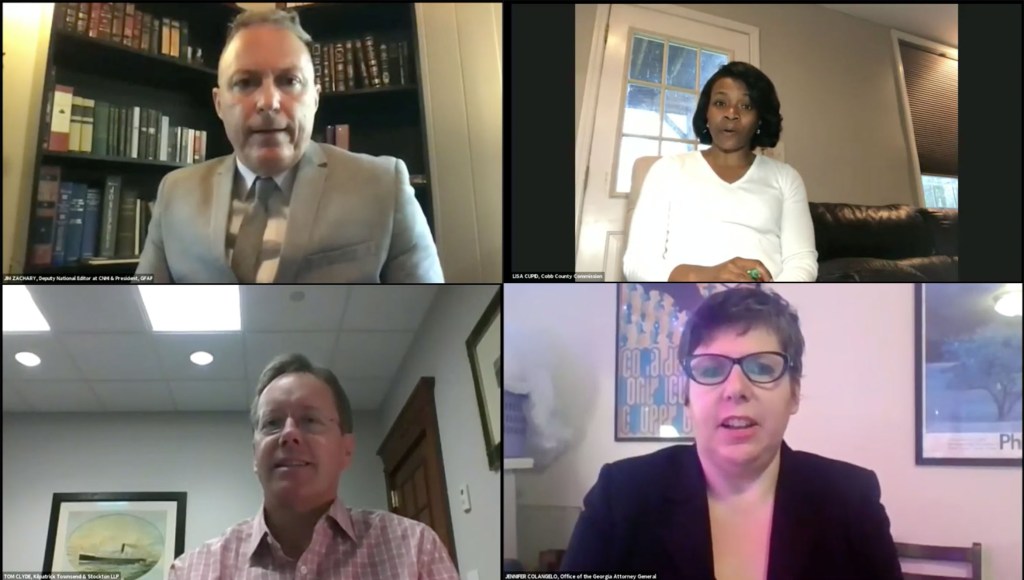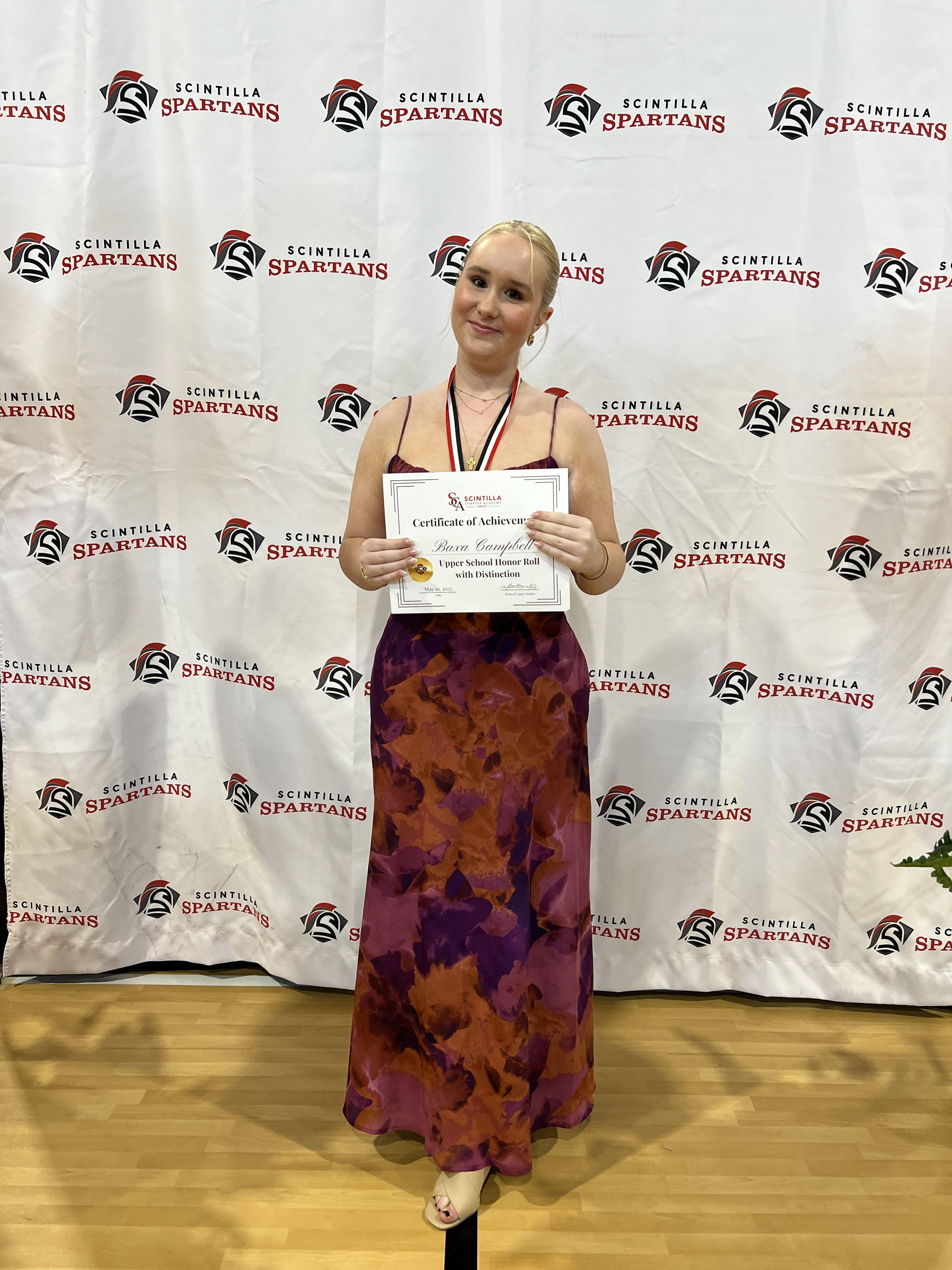Experts address how to comply with open meetings laws amid pandemic
Published 2:30 pm Tuesday, March 24, 2020

- Jim Zachary, deputy national editor for CNHI newspaper group; Lisa Cupid, Cobb County commissioner; Jennifer Colangelo, assistant attorney general at the Georgia Department of Law; and Tom Clyde, a First Amendment attorney with the firm Kilpatrick Townsend, discuss how elected officials can comply with public meetings laws online during a town hall videoconference on March 23.
ATLANTA — With virtual meetings becoming the new norm amid the COVID-19 outbreak, elected officials grapple with how to comply with public meetings laws online.
In a videoconference panel, hosted by the Georgia First Amendment Foundation, open meeting and open records experts addressed government transparency during an emergency.
The Office of the Attorney General is tasked with enforcing the state’s Sunshine Laws.
Jennifer Colangelo, assistant attorney general at the Georgia Department of Law, said within the Open Meetings Act, state agencies and local elected offices are allowed to hold teleconferences or live-streamed meetings — but they still have to comply with public notice requirements.
Under Georgia law, governing bodies must provide at least 24-hours notice of a special called or emergency public meeting by posting on its website, in a visible public place and notify the legal organ newspaper.
Local elected officials conducting business
As the coronavirus outbreak persists, more local government agencies will need to do business remotely.
Stephe Koontz, a Doraville council member, noted a concern such as finding the balance between making daily decisions such as zoning items with limited access to the public.
“A lot of us are suggesting to cities and counties to hold off on things that are not urgent,” Colangelo said. “But things that have to get done, go ahead and do them.”
However, recording a meeting and posting it later online does not satisfy open meetings laws, she said.
Lisa Cupid, Cobb County commissioner, said the county board there postponed zoning meetings because of limited public participation.
“I know from history that we get all slices of life that show up to our zoning hearings to weigh in on the matter,” she said. “… As a fellow elected official, I would be highly concerned about limiting public participation when they have a zoning nearby that could impact them.”
Sarah Brewerton-Palmer, a First Amendment attorney with the firm Caplan Cobb, said video broadcasting is not a requirement of open meeting laws.
For areas with limited broadband access, she said, state agencies in most cases provide a dial-in number so residents can listen to the meeting over the phone.
To some extent, Richard Griffiths, media ethicist and member of the First Amendment Foundation Board, said, “it’s going to be on the public to keep up to speed.”
Media and government partnership
Jim Zachary, president of the First Amendment Foundation and deputy national editor for CNHI newspaper group, said now more than ever, the government must rely on the media as a partner to circulate news to the public.
“The media is a partner in providing this information to the community. Because of how robust our platforms are, the media is able to keep people informed real-time,” Zachary said. “But when we see local officials being not as responsive, that’s a disservice to all of our communities.”
Georgia reporters are facing government agencies that “err on the side of caution” when divulging information, Zachary said, but public health officials should not view the media as an adversary.
“Communities are frustrated and they’re frustrated with the media because they’re not getting all the info they need,” Zachary said.
Public health officials must realize details of a person who tested positive for coronavirus such as their age, places they may have frequented or others they may have come in contact with is vital information for communities, he said.
“People need to be able to trust their government more than ever before, and trust comes from a place of transparency and openness,” Zachary said.
Privacy concerns amid a pandemic
Last week, the Georgia Department of Corrections cited Health Insurance Portability and Accountability Act as the reason it refused to disclose the facility where an employee tested positive for coronavirus.
Tom Clyde, a First Amendment attorney with the firm Kilpatrick Townsend, said HIPAA doesn’t apply.
HIPAA law, he said, allows the state agency or medical institution to release a person’s private information if it’s in the interest of protecting the public.
“If there is a clear threat to other people,” he said, “there is a clear exception.”
Reporters are often blocked from information through HIPAA privacy protections, but the laws can be used frivolously.
“I do think HIPAA gets used reflexively sometimes to try to refuse to disclose information,” Clyde said. “It’s very clear from the decision that got made last week and the language of HIPAA itself, that agencies shouldn’t be able to use that to prevent the public from getting information if the information is legitimately a matter of public concern.”
Colangelo said during a public health emergency, state agencies and local governments will vary in how they approach making meetings and records accessible to the public.
“The most important thing is for citizens to know what’s going on even if you’re not doing things by the book,” she said.
Zachary said that the media is not trying to catch local officials violating some minor technicalities and urged public officials to be open, transparent and comply with the law while working with local media to keep the public fully informed.





